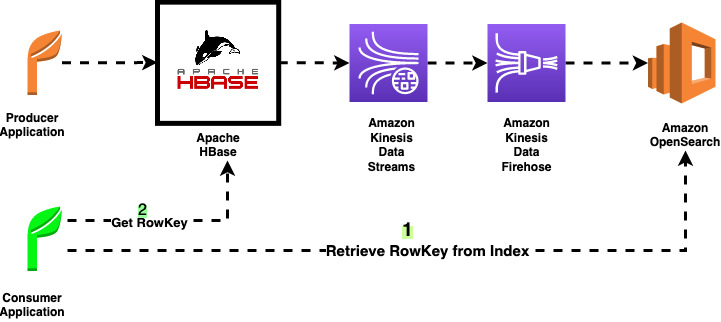AWS Big Data Blog
Category: Analytics
How Goldman Sachs built persona tagging using Apache Flink on Amazon EMR
The Global Investment Research (GIR) division at Goldman Sachs is responsible for providing research and insights to the firm’s clients in the equity, fixed income, currency, and commodities markets. One of the long-standing goals of the GIR team is to deliver a personalized experience and relevant research content to their research users. Previously, in order to customize […]
Stream Apache HBase edits for real-time analytics
August 30, 2023: Amazon Kinesis Data Analytics has been renamed to Amazon Managed Service for Apache Flink. Read the announcement in the AWS News Blog and learn more. Apache HBase is a non-relational database. To use the data, applications need to query the database to pull the data and changes from tables. In this post, […]
Unify log aggregation and analytics across compute platforms
February 9, 2024: Amazon Kinesis Data Firehose has been renamed to Amazon Data Firehose. Read the AWS What’s New post to learn more. Our customers want to make sure their users have the best experience running their application on AWS. To make this happen, you need to monitor and fix software problems as quickly as […]
Set advanced settings with the Amazon OpenSearch Service Dashboards API
Amazon OpenSearch Service is a fully managed service that you can use to deploy and operate OpenSearch clusters cost-effectively at scale in the AWS Cloud. The service makes it easy for you to perform interactive log analytics, real-time application monitoring, website search, and more by offering the latest versions of OpenSearch, support for 19 versions […]
Use the default IAM role in Amazon Redshift to simplify accessing other AWS services
Amazon Redshift is a fast, scalable, secure, and fully managed cloud data warehouse that makes it simple and cost-effective to analyze all your data using standard SQL. Amazon Redshift offers up to three times better price performance than any other cloud data warehouse, and can expand to petabyte scale. Today, tens of thousands of AWS […]
ConexED uses Amazon QuickSight to empower its institutional partners by unifying and curating powerful insights using engagement data
This post was co-written with Michael Gorham, Co-Founder and CTO of ConexED. ConexED is one of the country’s fastest-growing EdTech companies designed specifically for education to enhance the student experience and elevate student success. Founded as a startup in 2008 to remove obstacles that hinder student persistence and access to student services, ConexED provides advisors, […]
View summarized data with Amazon OpenSearch Service Index Transforms
Amazon OpenSearch Service recently announced support for Index Transforms. You can use Index Transforms to extract meaningful information from an existing index, and store the aggregated information in a new index. The key benefit of Index Transforms is faster retrieval of data by performing aggregations, grouping in advance, and storing those results in summarized views. For […]
Configure alerts of high CPU usage in applications using Amazon OpenSearch Service anomaly detection: Part 1
Amazon OpenSearch Service is a fully managed service that makes it easy to deploy, secure, and run Elasticsearch cost-effectively at scale. Amazon OpenSearch Service supports many use cases, including application monitoring, search, security information and event management (SIEM), and infrastructure monitoring. Amazon OpenSearch Service also offers a rich set of functionalities such as UltraWarm, fine-grained […]
Load CDC data by table and shape using Amazon Kinesis Data Firehose Dynamic Partitioning
February 9, 2024: Amazon Kinesis Data Firehose has been renamed to Amazon Data Firehose. Read the AWS What’s New post to learn more. Amazon Kinesis Data Firehose is the easiest way to reliably load streaming data into data lakes, data stores, and analytics services. Customers already use Amazon Kinesis Data Firehose to ingest raw data […]
SEEK Asia modernizes search with CI/CD and Amazon OpenSearch Service
This post was written in collaboration with Abdulsalam Alshallah (Salam), Software Architect, and Hans Roessler, Principal Software Engineer at SEEK Asia. SEEK is a market leader in online employment marketplaces with deep and rich insights into the future of work. As a global business, SEEK has a presence in Australia, New Zealand, Hong Kong, Southeast Asia, Brazil and Mexico and its websites attract over 400 million visits per year. SEEK Asia’s business operates across seven countries and includes leading portal brands such as jobsdb.com and jobstreet.com and leverages data and technology to create innovative solutions for candidates and hirers.
In this post, we share how SEEK Asia modernized their search-based system with a continuous integration and continuous delivery (CI/CD) pipeline and Amazon OpenSearch Service.







